Healthcare Management: Evidence-Based Solutions for Medication Errors
VerifiedAdded on 2023/06/04
|6
|1372
|380
Essay
AI Summary
This essay addresses medication errors in healthcare, emphasizing evidence-based decision-making for effective solutions. It highlights the importance of updating healthcare facility systems, including documentation processes, safety checklists, and computerized methods, alongside comprehensive staff training to enhance awareness and clinical practice. The essay further explores the role of effective leadership communication in managing medical teams, resolving conflicts arising from professional differences and resource allocation, and promoting a collaborative environment. Strategies such as face-to-face meetings are presented as effective methods for conflict resolution, emphasizing the value of diverse perspectives and proactive management in healthcare settings. Desklib offers a wide range of study tools and resources, including solved assignments and past papers, to support students' academic needs.
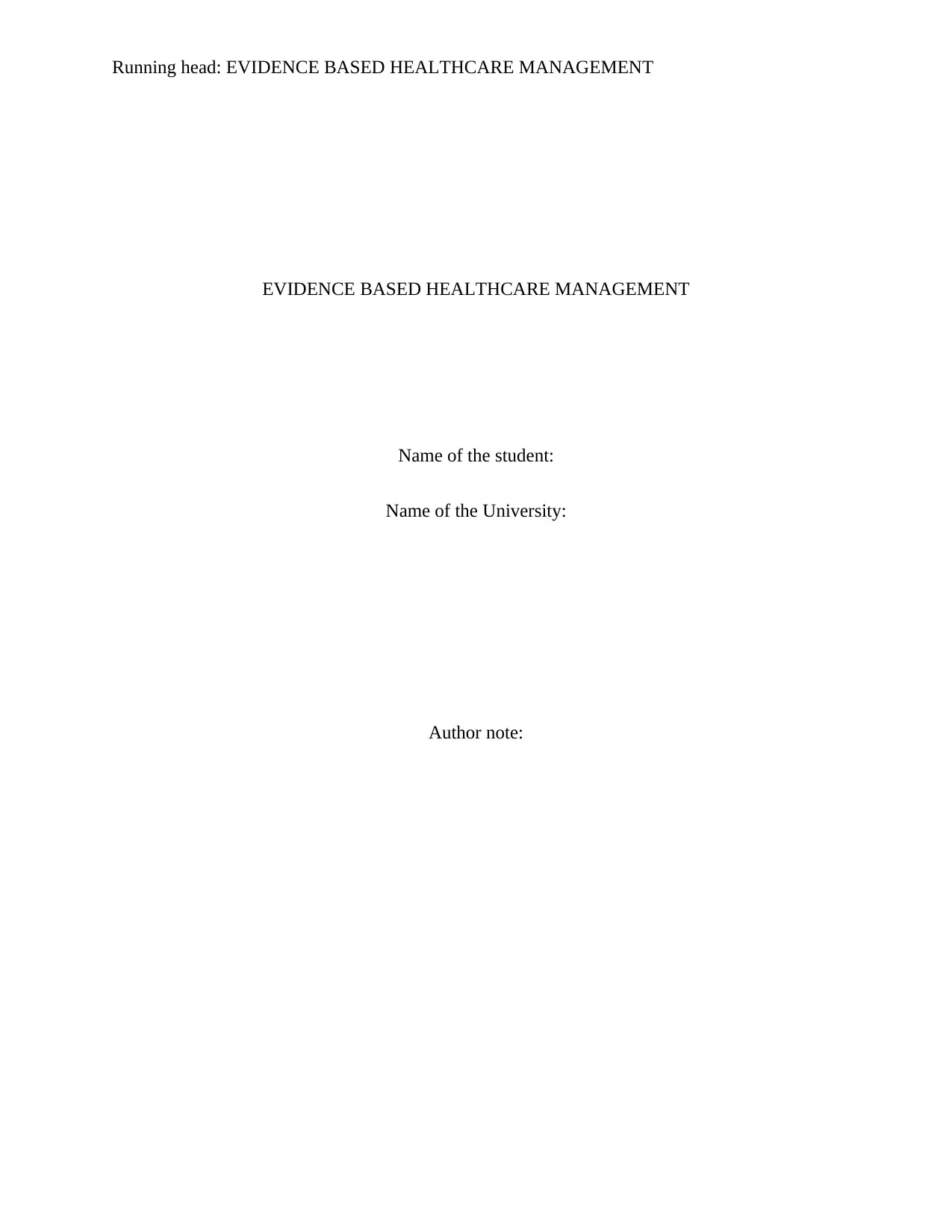
Running head: EVIDENCE BASED HEALTHCARE MANAGEMENT
EVIDENCE BASED HEALTHCARE MANAGEMENT
Name of the student:
Name of the University:
Author note:
EVIDENCE BASED HEALTHCARE MANAGEMENT
Name of the student:
Name of the University:
Author note:
Paraphrase This Document
Need a fresh take? Get an instant paraphrase of this document with our AI Paraphraser
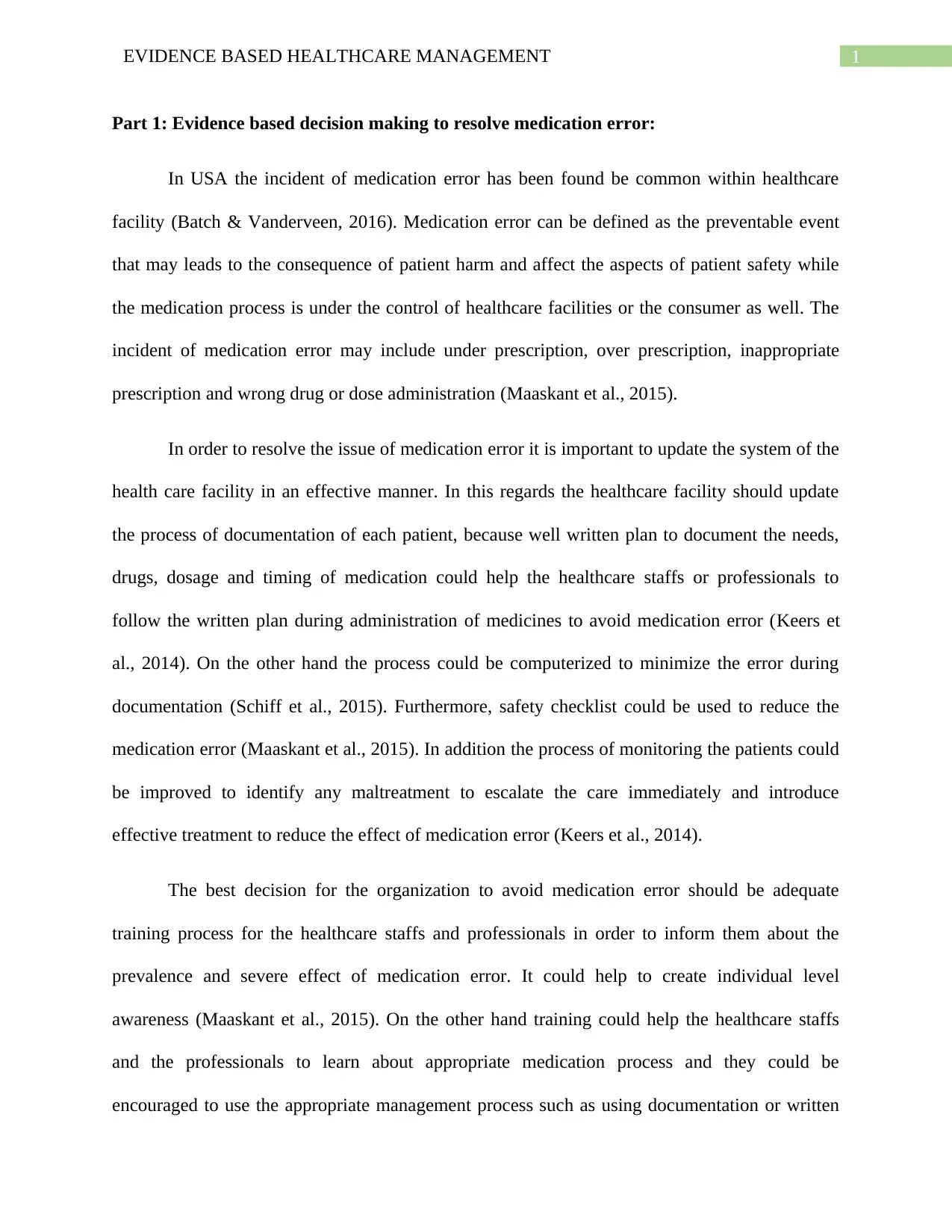
1EVIDENCE BASED HEALTHCARE MANAGEMENT
Part 1: Evidence based decision making to resolve medication error:
In USA the incident of medication error has been found be common within healthcare
facility (Batch & Vanderveen, 2016). Medication error can be defined as the preventable event
that may leads to the consequence of patient harm and affect the aspects of patient safety while
the medication process is under the control of healthcare facilities or the consumer as well. The
incident of medication error may include under prescription, over prescription, inappropriate
prescription and wrong drug or dose administration (Maaskant et al., 2015).
In order to resolve the issue of medication error it is important to update the system of the
health care facility in an effective manner. In this regards the healthcare facility should update
the process of documentation of each patient, because well written plan to document the needs,
drugs, dosage and timing of medication could help the healthcare staffs or professionals to
follow the written plan during administration of medicines to avoid medication error (Keers et
al., 2014). On the other hand the process could be computerized to minimize the error during
documentation (Schiff et al., 2015). Furthermore, safety checklist could be used to reduce the
medication error (Maaskant et al., 2015). In addition the process of monitoring the patients could
be improved to identify any maltreatment to escalate the care immediately and introduce
effective treatment to reduce the effect of medication error (Keers et al., 2014).
The best decision for the organization to avoid medication error should be adequate
training process for the healthcare staffs and professionals in order to inform them about the
prevalence and severe effect of medication error. It could help to create individual level
awareness (Maaskant et al., 2015). On the other hand training could help the healthcare staffs
and the professionals to learn about appropriate medication process and they could be
encouraged to use the appropriate management process such as using documentation or written
Part 1: Evidence based decision making to resolve medication error:
In USA the incident of medication error has been found be common within healthcare
facility (Batch & Vanderveen, 2016). Medication error can be defined as the preventable event
that may leads to the consequence of patient harm and affect the aspects of patient safety while
the medication process is under the control of healthcare facilities or the consumer as well. The
incident of medication error may include under prescription, over prescription, inappropriate
prescription and wrong drug or dose administration (Maaskant et al., 2015).
In order to resolve the issue of medication error it is important to update the system of the
health care facility in an effective manner. In this regards the healthcare facility should update
the process of documentation of each patient, because well written plan to document the needs,
drugs, dosage and timing of medication could help the healthcare staffs or professionals to
follow the written plan during administration of medicines to avoid medication error (Keers et
al., 2014). On the other hand the process could be computerized to minimize the error during
documentation (Schiff et al., 2015). Furthermore, safety checklist could be used to reduce the
medication error (Maaskant et al., 2015). In addition the process of monitoring the patients could
be improved to identify any maltreatment to escalate the care immediately and introduce
effective treatment to reduce the effect of medication error (Keers et al., 2014).
The best decision for the organization to avoid medication error should be adequate
training process for the healthcare staffs and professionals in order to inform them about the
prevalence and severe effect of medication error. It could help to create individual level
awareness (Maaskant et al., 2015). On the other hand training could help the healthcare staffs
and the professionals to learn about appropriate medication process and they could be
encouraged to use the appropriate management process such as using documentation or written
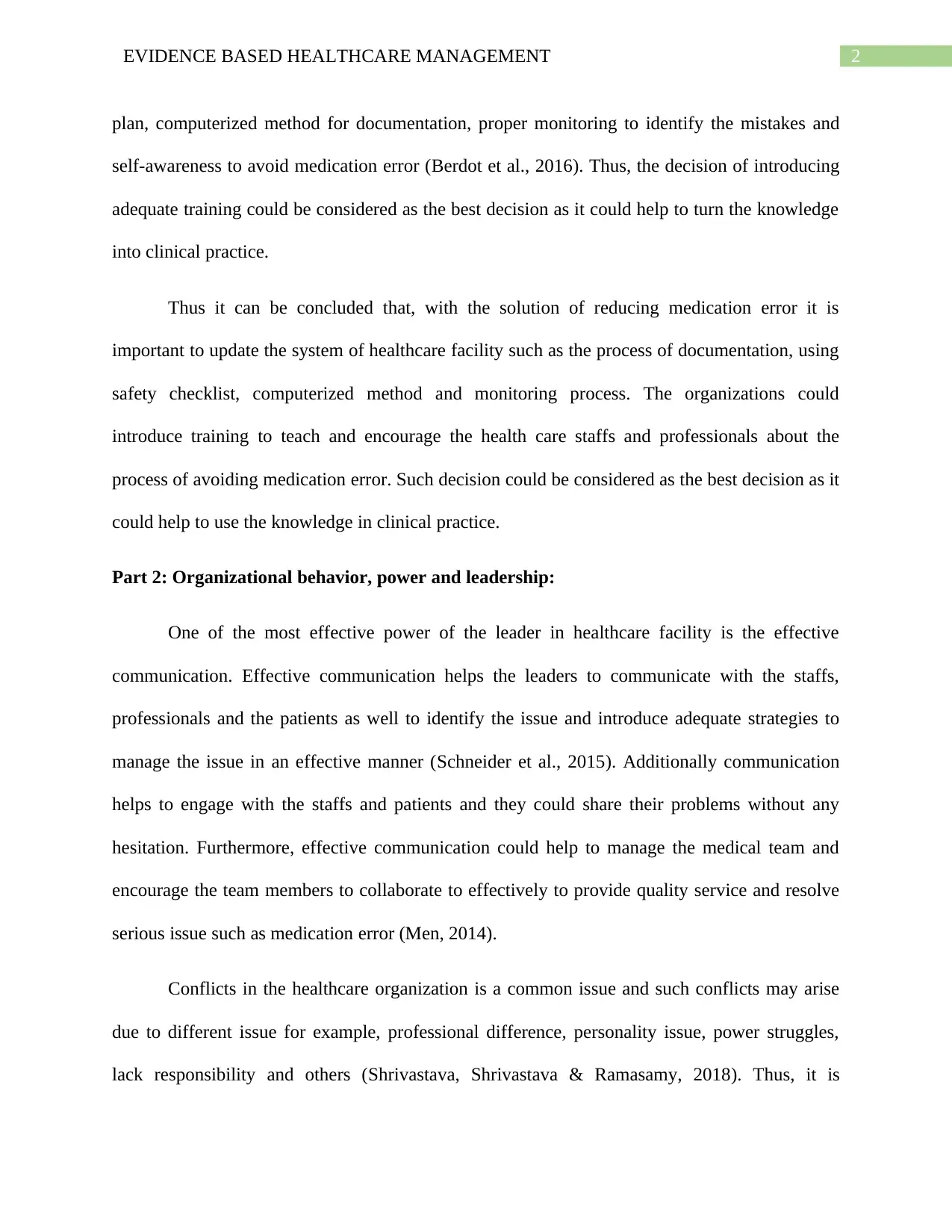
2EVIDENCE BASED HEALTHCARE MANAGEMENT
plan, computerized method for documentation, proper monitoring to identify the mistakes and
self-awareness to avoid medication error (Berdot et al., 2016). Thus, the decision of introducing
adequate training could be considered as the best decision as it could help to turn the knowledge
into clinical practice.
Thus it can be concluded that, with the solution of reducing medication error it is
important to update the system of healthcare facility such as the process of documentation, using
safety checklist, computerized method and monitoring process. The organizations could
introduce training to teach and encourage the health care staffs and professionals about the
process of avoiding medication error. Such decision could be considered as the best decision as it
could help to use the knowledge in clinical practice.
Part 2: Organizational behavior, power and leadership:
One of the most effective power of the leader in healthcare facility is the effective
communication. Effective communication helps the leaders to communicate with the staffs,
professionals and the patients as well to identify the issue and introduce adequate strategies to
manage the issue in an effective manner (Schneider et al., 2015). Additionally communication
helps to engage with the staffs and patients and they could share their problems without any
hesitation. Furthermore, effective communication could help to manage the medical team and
encourage the team members to collaborate to effectively to provide quality service and resolve
serious issue such as medication error (Men, 2014).
Conflicts in the healthcare organization is a common issue and such conflicts may arise
due to different issue for example, professional difference, personality issue, power struggles,
lack responsibility and others (Shrivastava, Shrivastava & Ramasamy, 2018). Thus, it is
plan, computerized method for documentation, proper monitoring to identify the mistakes and
self-awareness to avoid medication error (Berdot et al., 2016). Thus, the decision of introducing
adequate training could be considered as the best decision as it could help to turn the knowledge
into clinical practice.
Thus it can be concluded that, with the solution of reducing medication error it is
important to update the system of healthcare facility such as the process of documentation, using
safety checklist, computerized method and monitoring process. The organizations could
introduce training to teach and encourage the health care staffs and professionals about the
process of avoiding medication error. Such decision could be considered as the best decision as it
could help to use the knowledge in clinical practice.
Part 2: Organizational behavior, power and leadership:
One of the most effective power of the leader in healthcare facility is the effective
communication. Effective communication helps the leaders to communicate with the staffs,
professionals and the patients as well to identify the issue and introduce adequate strategies to
manage the issue in an effective manner (Schneider et al., 2015). Additionally communication
helps to engage with the staffs and patients and they could share their problems without any
hesitation. Furthermore, effective communication could help to manage the medical team and
encourage the team members to collaborate to effectively to provide quality service and resolve
serious issue such as medication error (Men, 2014).
Conflicts in the healthcare organization is a common issue and such conflicts may arise
due to different issue for example, professional difference, personality issue, power struggles,
lack responsibility and others (Shrivastava, Shrivastava & Ramasamy, 2018). Thus, it is
⊘ This is a preview!⊘
Do you want full access?
Subscribe today to unlock all pages.

Trusted by 1+ million students worldwide
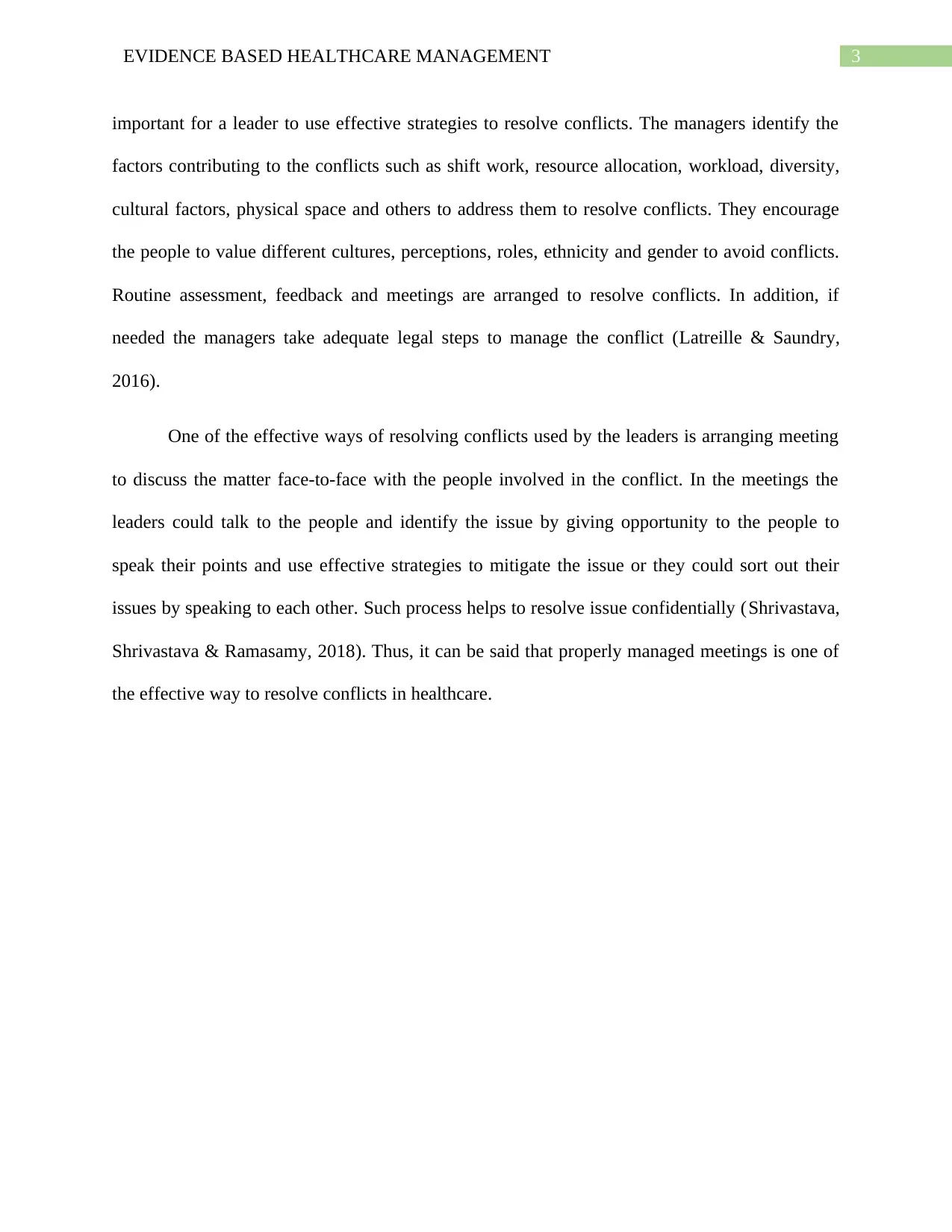
3EVIDENCE BASED HEALTHCARE MANAGEMENT
important for a leader to use effective strategies to resolve conflicts. The managers identify the
factors contributing to the conflicts such as shift work, resource allocation, workload, diversity,
cultural factors, physical space and others to address them to resolve conflicts. They encourage
the people to value different cultures, perceptions, roles, ethnicity and gender to avoid conflicts.
Routine assessment, feedback and meetings are arranged to resolve conflicts. In addition, if
needed the managers take adequate legal steps to manage the conflict (Latreille & Saundry,
2016).
One of the effective ways of resolving conflicts used by the leaders is arranging meeting
to discuss the matter face-to-face with the people involved in the conflict. In the meetings the
leaders could talk to the people and identify the issue by giving opportunity to the people to
speak their points and use effective strategies to mitigate the issue or they could sort out their
issues by speaking to each other. Such process helps to resolve issue confidentially (Shrivastava,
Shrivastava & Ramasamy, 2018). Thus, it can be said that properly managed meetings is one of
the effective way to resolve conflicts in healthcare.
important for a leader to use effective strategies to resolve conflicts. The managers identify the
factors contributing to the conflicts such as shift work, resource allocation, workload, diversity,
cultural factors, physical space and others to address them to resolve conflicts. They encourage
the people to value different cultures, perceptions, roles, ethnicity and gender to avoid conflicts.
Routine assessment, feedback and meetings are arranged to resolve conflicts. In addition, if
needed the managers take adequate legal steps to manage the conflict (Latreille & Saundry,
2016).
One of the effective ways of resolving conflicts used by the leaders is arranging meeting
to discuss the matter face-to-face with the people involved in the conflict. In the meetings the
leaders could talk to the people and identify the issue by giving opportunity to the people to
speak their points and use effective strategies to mitigate the issue or they could sort out their
issues by speaking to each other. Such process helps to resolve issue confidentially (Shrivastava,
Shrivastava & Ramasamy, 2018). Thus, it can be said that properly managed meetings is one of
the effective way to resolve conflicts in healthcare.
Paraphrase This Document
Need a fresh take? Get an instant paraphrase of this document with our AI Paraphraser
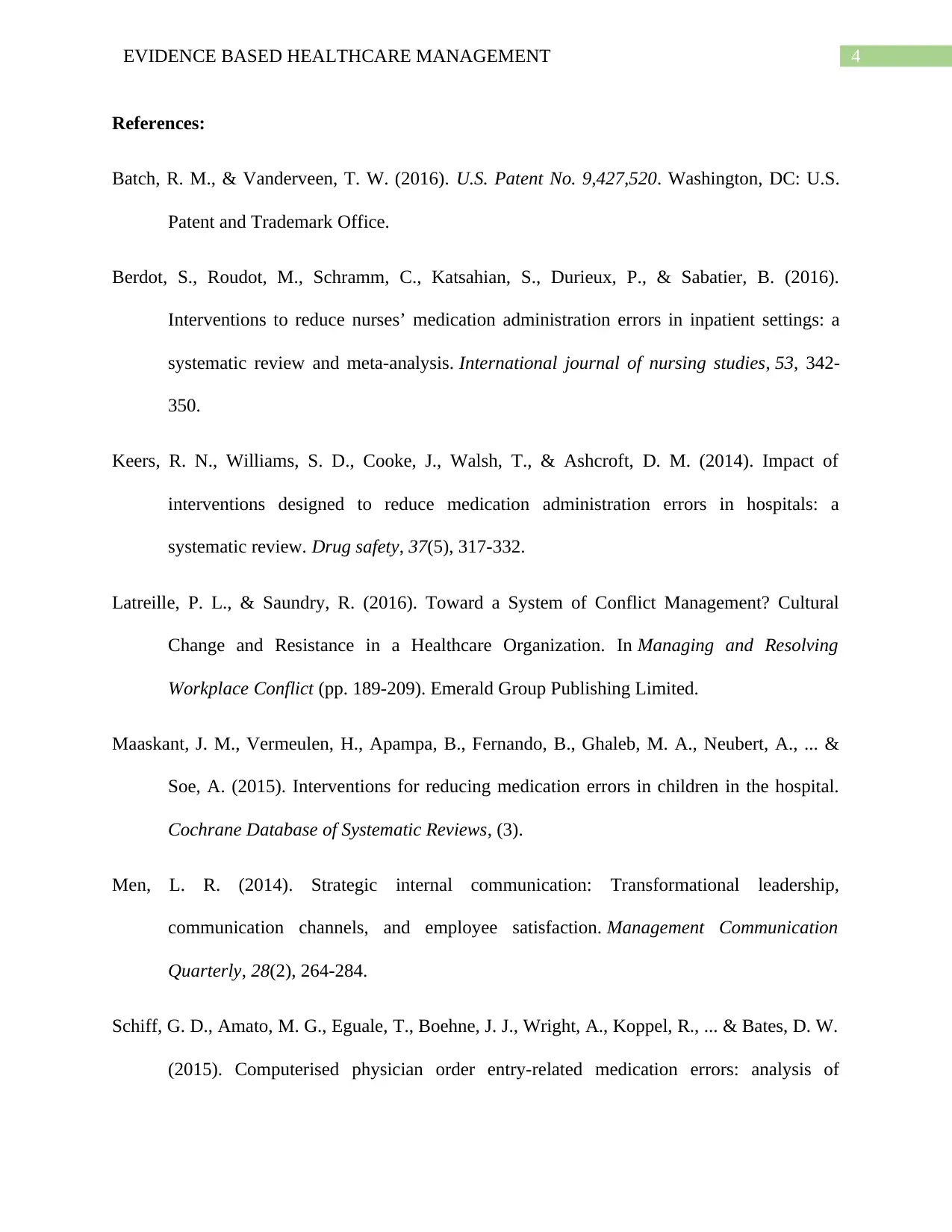
4EVIDENCE BASED HEALTHCARE MANAGEMENT
References:
Batch, R. M., & Vanderveen, T. W. (2016). U.S. Patent No. 9,427,520. Washington, DC: U.S.
Patent and Trademark Office.
Berdot, S., Roudot, M., Schramm, C., Katsahian, S., Durieux, P., & Sabatier, B. (2016).
Interventions to reduce nurses’ medication administration errors in inpatient settings: a
systematic review and meta-analysis. International journal of nursing studies, 53, 342-
350.
Keers, R. N., Williams, S. D., Cooke, J., Walsh, T., & Ashcroft, D. M. (2014). Impact of
interventions designed to reduce medication administration errors in hospitals: a
systematic review. Drug safety, 37(5), 317-332.
Latreille, P. L., & Saundry, R. (2016). Toward a System of Conflict Management? Cultural
Change and Resistance in a Healthcare Organization. In Managing and Resolving
Workplace Conflict (pp. 189-209). Emerald Group Publishing Limited.
Maaskant, J. M., Vermeulen, H., Apampa, B., Fernando, B., Ghaleb, M. A., Neubert, A., ... &
Soe, A. (2015). Interventions for reducing medication errors in children in the hospital.
Cochrane Database of Systematic Reviews, (3).
Men, L. R. (2014). Strategic internal communication: Transformational leadership,
communication channels, and employee satisfaction. Management Communication
Quarterly, 28(2), 264-284.
Schiff, G. D., Amato, M. G., Eguale, T., Boehne, J. J., Wright, A., Koppel, R., ... & Bates, D. W.
(2015). Computerised physician order entry-related medication errors: analysis of
References:
Batch, R. M., & Vanderveen, T. W. (2016). U.S. Patent No. 9,427,520. Washington, DC: U.S.
Patent and Trademark Office.
Berdot, S., Roudot, M., Schramm, C., Katsahian, S., Durieux, P., & Sabatier, B. (2016).
Interventions to reduce nurses’ medication administration errors in inpatient settings: a
systematic review and meta-analysis. International journal of nursing studies, 53, 342-
350.
Keers, R. N., Williams, S. D., Cooke, J., Walsh, T., & Ashcroft, D. M. (2014). Impact of
interventions designed to reduce medication administration errors in hospitals: a
systematic review. Drug safety, 37(5), 317-332.
Latreille, P. L., & Saundry, R. (2016). Toward a System of Conflict Management? Cultural
Change and Resistance in a Healthcare Organization. In Managing and Resolving
Workplace Conflict (pp. 189-209). Emerald Group Publishing Limited.
Maaskant, J. M., Vermeulen, H., Apampa, B., Fernando, B., Ghaleb, M. A., Neubert, A., ... &
Soe, A. (2015). Interventions for reducing medication errors in children in the hospital.
Cochrane Database of Systematic Reviews, (3).
Men, L. R. (2014). Strategic internal communication: Transformational leadership,
communication channels, and employee satisfaction. Management Communication
Quarterly, 28(2), 264-284.
Schiff, G. D., Amato, M. G., Eguale, T., Boehne, J. J., Wright, A., Koppel, R., ... & Bates, D. W.
(2015). Computerised physician order entry-related medication errors: analysis of
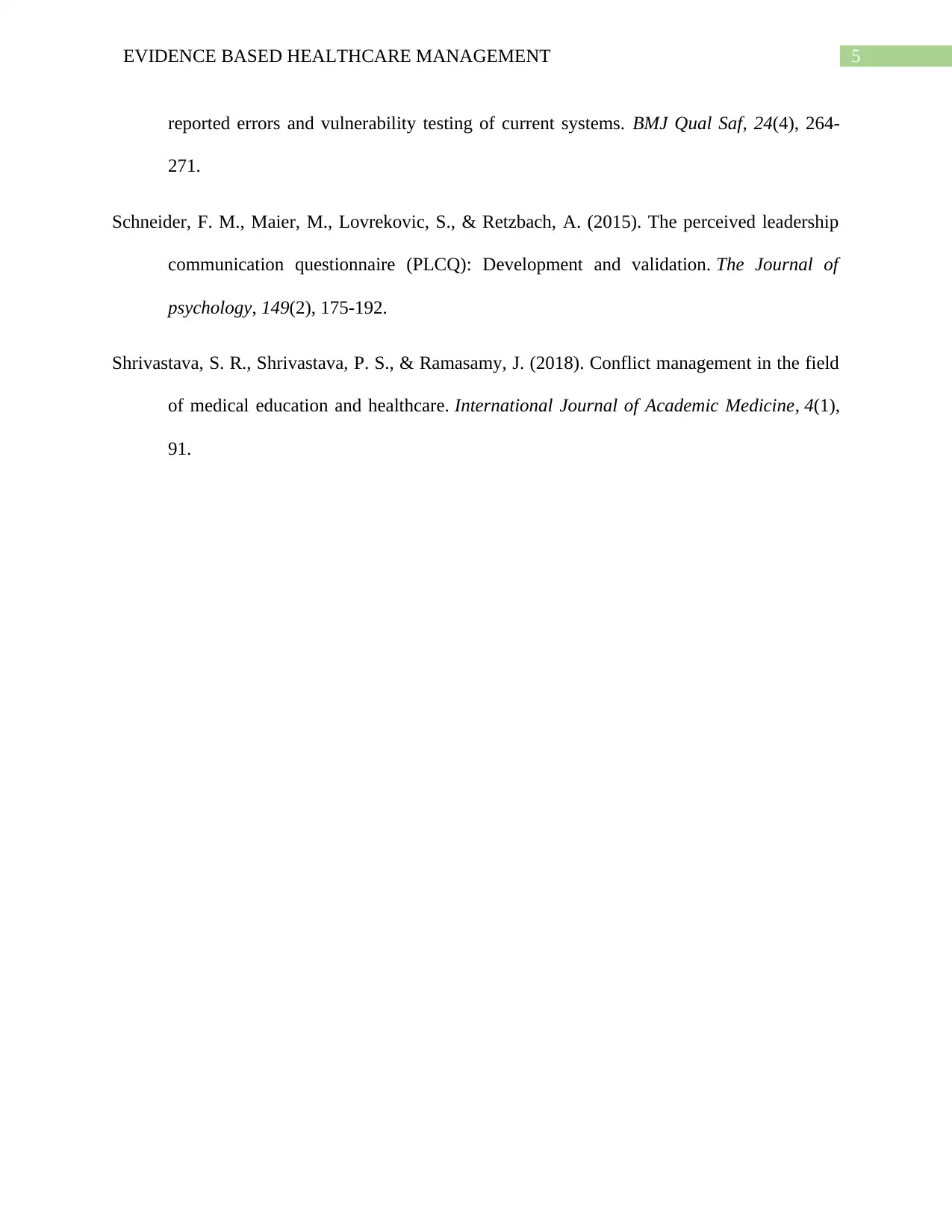
5EVIDENCE BASED HEALTHCARE MANAGEMENT
reported errors and vulnerability testing of current systems. BMJ Qual Saf, 24(4), 264-
271.
Schneider, F. M., Maier, M., Lovrekovic, S., & Retzbach, A. (2015). The perceived leadership
communication questionnaire (PLCQ): Development and validation. The Journal of
psychology, 149(2), 175-192.
Shrivastava, S. R., Shrivastava, P. S., & Ramasamy, J. (2018). Conflict management in the field
of medical education and healthcare. International Journal of Academic Medicine, 4(1),
91.
reported errors and vulnerability testing of current systems. BMJ Qual Saf, 24(4), 264-
271.
Schneider, F. M., Maier, M., Lovrekovic, S., & Retzbach, A. (2015). The perceived leadership
communication questionnaire (PLCQ): Development and validation. The Journal of
psychology, 149(2), 175-192.
Shrivastava, S. R., Shrivastava, P. S., & Ramasamy, J. (2018). Conflict management in the field
of medical education and healthcare. International Journal of Academic Medicine, 4(1),
91.
⊘ This is a preview!⊘
Do you want full access?
Subscribe today to unlock all pages.

Trusted by 1+ million students worldwide
1 out of 6
Related Documents
Your All-in-One AI-Powered Toolkit for Academic Success.
+13062052269
info@desklib.com
Available 24*7 on WhatsApp / Email
![[object Object]](/_next/static/media/star-bottom.7253800d.svg)
Unlock your academic potential
Copyright © 2020–2025 A2Z Services. All Rights Reserved. Developed and managed by ZUCOL.





